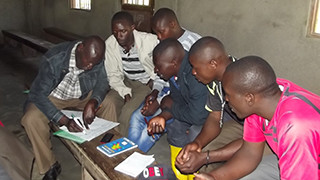The iTSCi programme helps ensure that the minerals used in electronics and many other consumer products are responsibly sourced and don’t contribute to serious human rights abuses by helping miners, companies and authorities to implement traceability and due diligence. Now, iTSCi is also using its presence and infrastructure to improve lives in the Great Lakes Region in other ways. Communities who depend on artisanal mining may be lacking in formal education due to both the migratory nature and remoteness of the work, and some miners can become indebted to informal creditors with challenging interest rates or other arrangements. The ‘WORTH for Miners’ projects are addressing these issues directly.
WORTH is an existing award winning approach developed by iTSCi’s field partner Pact for other business areas which is now being adapted to the circumstances of artisanal and small scale mining communities. With funding from the Dutch Ministry of Foreign Affairs (DMFA), iTSCi is implementing this new ‘WORTH for Miners’ project in the DRC, aiming to improve miners incomes by training and strengthening literacy, numeracy, savings and financial skills through an engaging and appropriate curriculum. By the end of 2016, fifteen WORTH groups had already been created in two pilot areas in Rubaya (North Kivu) and Manono (Katanga).
Members of WORTH groups meet on a weekly basis to deposit savings to the group’s bank and learn the fundamentals of literacy, numeracy, savings, finance management and small business. Once their funds reach a target, loans will be made to members. “We deposit 1,000 francs (equivalent of US$1) weekly. Through this initiative, we are helping one another and trying to figure out how to make our lives better” explained Joseph Maoneo, a 55-year-old miner and farmer.
A chair(wo)man, treasurer, secretary and advisor are elected in each group and they receive materials to help them effectively manage the group. Additionally, literacy volunteers teach fellow group members how to read and write. A four-day training on roles and responsibilities, bank management, planning methodology, WORTH actions and literacy for adults was held for the elected members and volunteers. “The training taught me how to manage the bank, to fill in the ledger and how to teach adults to read and write” explained Alexis Nahimana, 46, advisor in his group.
In addition to local economic development, WORTH seeks to empower participants to make better life choices, through awareness-raising on topics like human rights, mine health and safety, productivity, child labour, and women in mining. “Worth will strengthen cohesion amongst people in my village”, said Alexis. “It will help them go forward and empower them to better support themselves”.

Launch of the WORTH group in Rubaya [Photo: Pact]
